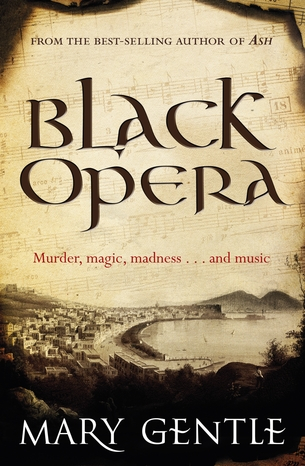Why you can trust GamesRadar+
Mary Gentle isn’t one of the genre’s most prolific authors – Black Opera is her first novel in six years – but a book with her name on the cover is an event worth looking forward to. She always goes the extra mile to create rich, unusual alternative-history worlds for her stories – twice picking up a master’s degree along the way, because hey, why not? And whether it’s the alchemical 17th-century England of the White Crow series, Ash ’s gritty late-medieval Burgundy, or Ilario ’s Visigothic empire of Carthage, for Gentle, history is not simply an exotic backdrop for familiar defeat-the-Dark-Lord tales. Rather, she seeks the fantastical within the historical, deriving her stories and her themes from the imagination and concerns of the periods she picks.
For Black Opera , she turns to Naples in the mid-1800s, marrying the city’s passion for bel canto opera to charged contemporary debates about science and heresy. Ambitious up-and-coming librettist Conrad Scalese finds himself the centre of both ecclesiastical and royal attention when the theatre hosting his new opera is hit by lightning on opening night. The Inquisition blame Conrad’s daringly open atheism; Ferdinand II sees an “opera miracle” – magic raised by the power of song – that he might use to his kingdom’s advantage.
Some years before, he explains to Conrad, a secret society called the Prince’s Men managed to set off a volcano in Indonesia using a handful of singers belting out tunes on a boat. Now they plan to do the same again. And where better for their apocalypse than the Bay of Naples, an area hardly short of a volcano or three? The only way to stop this “black opera” is a spot of counter-programming: the writing, casting and staging of an entirely new opera, so emotionally powerful it’ll drown out the bad guys’ efforts. In secret. In barely six weeks. What could be simpler?
When it focuses on this half-crazed quest, the novel soars. There’s an infectious energy to the sequences in which librettist, composer and stars test ideas, try out tunes, and repeatedly tear things up to rearrange them in new ways. Gentle’s skill at meshing together a motley array of characters in common purpose and banter, so evident in Ash ’s mercenary band, is on display again here. (At one stage Conrad even observes that opera companies and military units share a similar dynamic of mocking solidarity under fire.) It’s a fun and compelling portrait of the creative process that goes a long way towards making opera come alive even for readers whose prior knowledge of the form could be summed up in a sentence.
Much less successful, unfortunately, are the 150 or so pages either side. After a fairly snappy opening, the novel’s early stages get bogged down in an off-puttingly clunky debate about the relative merits of science and religion, followed by an infodump about the Prince’s Men that mostly just repeats, at length, several things we already learned in the prologue. After the fabulous performance of the opera, meanwhile, the novel’s absurdly drawn-out climax tests readerly patience by harping on about a love triangle that wasn’t particularly involving the first six times it got brought up.
In many ways, this is a consequence of the sort of story being told. Black Opera is suffused with a love of its inspiration, from the beats of the plot – twists, revelations, cross-dressing, illicit romantic entanglements, needlessly melodramatic cliffhangers – to the phrasing. Not a page goes by without a passionate curse in Italian; barely a line of dialogue without an exclamation mark. It’s unabashedly larger than life – but it’s more convincing and engaging in its smaller, human scale moments.
Nic Clarke twitter.com/bibliolicious
Read more of our book reviews .
SFX Magazine is the world's number one sci-fi, fantasy, and horror magazine published by Future PLC. Established in 1995, SFX Magazine prides itself on writing for its fans, welcoming geeks, collectors, and aficionados into its readership for over 25 years. Covering films, TV shows, books, comics, games, merch, and more, SFX Magazine is published every month. If you love it, chances are we do too and you'll find it in SFX.



